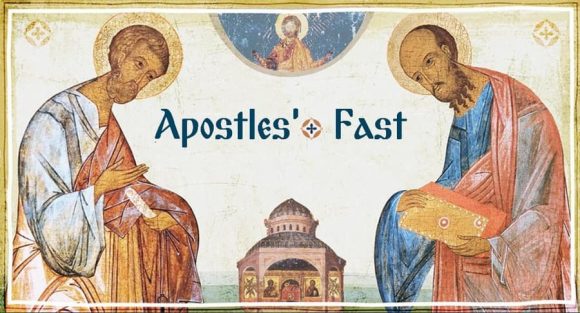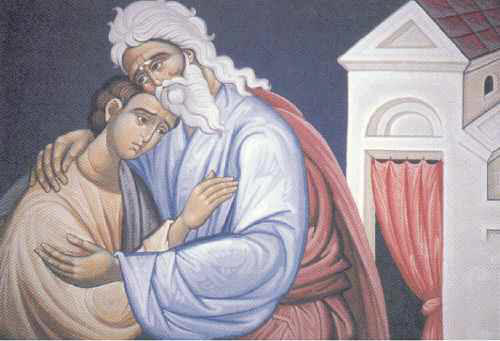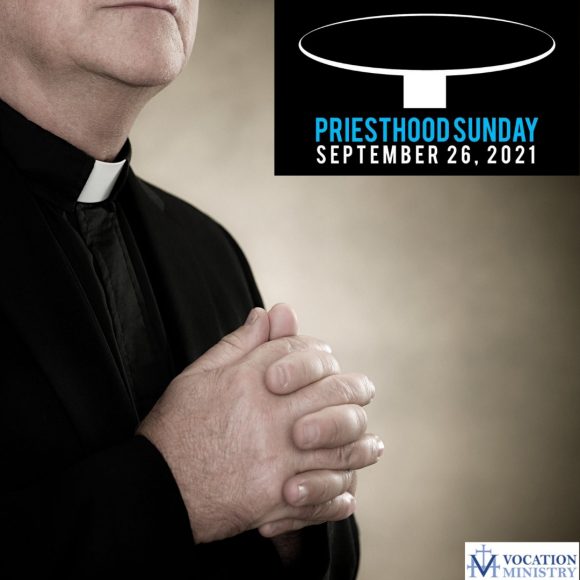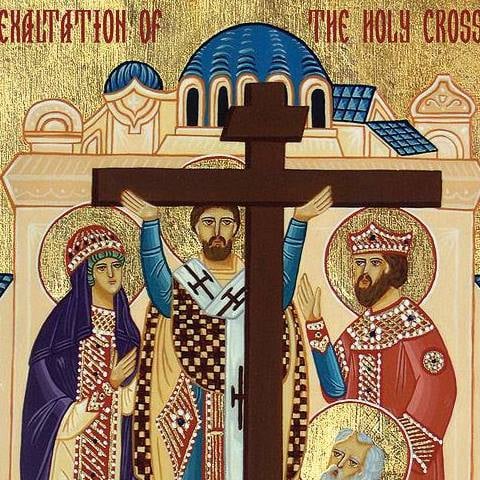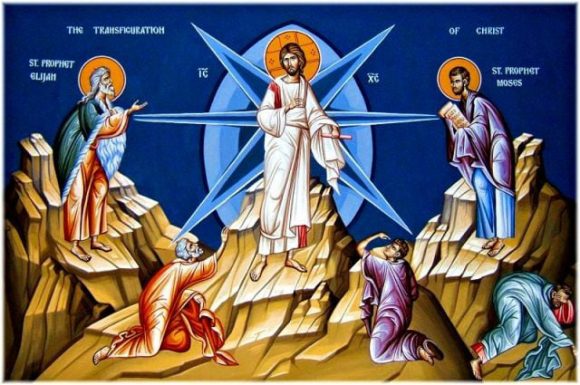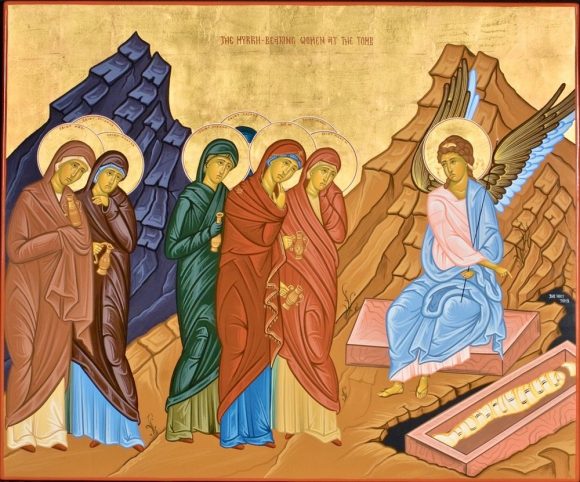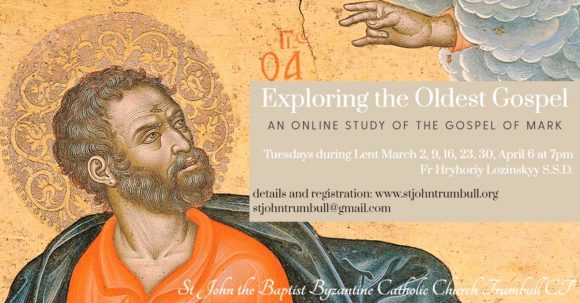The Apostles’ or Peter and Paul Fast begins TODAY, June 13 (new calendar).
Category: Catechesis
Sunday of the Prodigal Son
The parable read today is usually called “the parable of the Prodigal Son,” who is at the center of the story. It might also be called “the parable of the Merciful Father,” who welcomes back his son, embracing him, restoring him to his position, declaring a joyous celebration without even seeming to hear or listen to his son’s confession or protestation. It might also be called “the parable of the Petulant Son,” who is grumpy and peeved at the father’s merciful loving kindness because he thinks that he himself is so much better than his brother. As we prepare for the Great Fast, do we see a pattern developing? The pharisee thought he was much better than the tax-collector, the older son thought he was so much better than his prodigal brother, but God overflows in love for all his creatures. Perhaps the real main purpose of the Great Fast is to turn from pride to humility, to begin to see others through the eyes of God, to overflow in love for others. Truly, what does it mean to be a Christian?
The return of the prodigal Son was marked by a great banquet given by the Merciful Father. We are all invited to that banquet, celebrated at every Divine Liturgy, where the food is not the “fattened calf” but the body and blood of our Lord, the only-begotten Son of the Father. How do we approach this banquet, in the humility of the son who acknowledges his unworthiness or in the pride of the older son, who objects to the presence of his weaker brother? The answer is what it means to be a Christian.
***
“Receive me now, Lord, as you once received the Prodigal. Open to me your fatherly arms, and in thanksgiving I will sing of your glory and goodness” (Sunday of the Prodigal Son Canon, Ode 1, troparion 3)
The parable of the Prodigal Son is also commemorated on the Second Sunday of the Great Fast, in the Canon of Matins, because the origin of the Triodion is from Palestine, where this Gospel was read on the Second Sunday.
Meditation by Archpriest David Petras
Priesthood Sunday 2021
Please pray for Fr Iura, our priest, especially this weekend for Priesthood Sunday. Tell Fr Iura Godenciuc you are praying for him, too.
Let us build up the priesthood, one priest at a time!
Exaltation of the Holy Cross
Today, September 14th is the commemoration of the Feast of the Exaltation (Discovery) of the Holy Cross.
From a discourse by the bishop St. Andrew of Crete, we learn:
We are celebrating the feast of the Cross,
which drives away darkness and brought in the light.
As we keep the feast,
we are lifted up with the crucified Christ,
leaving behind us earth and sin
so that we may gain the things above.
So great and outstanding a possession is the Cross
that he who wins it has won a treasure.
Rightly could I call this treasure the fairest of all fair things
and the costliest, in fact as well as in name,
for on it and through it and for its sake
the riches of salvation that had been lost
were restored to us…
And if you would understand that the cross is Christ’s triumph,
hear what He Himself also said:
“When I am lifted up,
then I will draw all men to Myself.”
Now you can see that the Cross is Christ’s glory and triumph.
Blessings for the feast, I hope you are celebrating!
Commemorating the Transfiguration
The Divine Liturgy is at 9am today.
Why do we commemorate the experience of the Lord’s Transfiguration? Can you locate what is revealed in sacred Scripture?
Let’s start with the Transfiguration in Scripture –You can find the narrative in the synoptic Gospels Matthew 17:1–8, Mark 9:2–8, Luke 9:28–36.
“Today we celebrate the overwhelming beauty of human nature, restored in Christ as a prelude to the Resurrection.
The gospel event served to strengthen the apostles’ faith before his passion and death. In the ancient Church, this lesson was read during Lent. Some time before the sixth century, a church was dedicated to the Transfiguration on Mt Tabor, and the feast acquired the calendar date we now observe.
The Transfiguration is the clearest epiphany recorded in Scripture. Moses and Elijah, representing the Law and the Prophets, appear with Christ, bearing witness to him as Messiah. The light emanating from Christ in this vision has provided a long line of Church fathers with a theme that has become the unifying thread in Byzantine theology — the vision of God as light.
This tradition is founded on St John, one of Christ’s companions on the mountain. He opens his account of the good news by saying, “The Word was the true light that enlightens all people. He lived among us, and we saw his glory!”
In this light, humanity, along with all creation, enjoys this deifying vision. Furthermore, our happiness will increase along with our ability to see the reality of this manifestation.
It has been the task of monastics of all times to embody the fruits of this vision for the encouragement of all. For in true asceticism, the world is not held in contempt, but seen in the light of its original beauty which in turn calls forth compassion and love.” (NS)
Sunday of Myrrh-bearing Women –resources
Three weeks ago we celebrated Pascha. Now we are at the Second Sunday after Easter (April 18, 2021) — the Sunday of the Myrrh-bearing Women. These women pour the oil of our salvation over the bodies of those who belong to Christ Jesus; the oil announces LIFE. Who are these women? Do you know who we are talking about? Scripture reveals to us the names of the women, each with a personal history and each with a mission (like us). They are Mary Magdalene, Mary the mother of Jose, Mary, the mother of James, and Salome. Plus, we have Joseph of Arimathea. Each person here is essential for making the Risen Lord known and loved and followed.
When the women encounter the Risen Lord at the tomb He tells them not to be afraid at the sight of Him and of His announcement: the crucified is now risen. His promise is true; the offer to be united with God is made good, Life is bestowed upon us. The first act of the Risen Lord is to give the women a central mission, a particular service (a diaconia) for the spread of the Gospel: go and tell the disciples and Peter, that crucified Jesus is now risen, He is alive.
The Church understands this biblical narrative of vocation and place in the Way –the Way of the Lord– in generations: the first generation are the Apostles, then the disciples, and the deacons (seen first in the person of Joseph of Arimathea, then the other deacons we read about in the Apostles). No one group can exist without the other because of the particularity of each God-mission given to each person. This mission we speak of, as St John Henry Newman tells us, is the mission given by God is unique, unrepeatable, not transferable, given for a specific purpose. Some are called to be priests, some deacons, some catechists, some nurses, some bakers, some gardeners, some machinists, some writers, some lawyers, etc. The mission the Lord gives us links us to him and those others who have served the Gospel and the Church through 2000 years.
St. Peter Chrysologus speaks of the mission of the Women and the apostles, “The women were first to honor the risen Christ, the apostles first to suffer for him. The women were ready with spices; the apostles prepared for scourges. The women entered the tomb; the apostles would soon enter the dungeon. The women hastened to express their eulogy; the apostles embraced chains for his sake. The women poured oils; the apostles poured out their blood.”
The Resurrectional troparion (in the Ukrainian tone), the catechetical resources for the children AND the Gospel reflection with Melkite Father Hezekias and Sebastian are found here.
Christ is risen!
Free online Bible Study
Herewith is a flyer for a Bible study on the oldest Gospel, Mark. The presenter is Father Greg Lozinskyy, pastor of St John the Baptist Byzantine Catholic Church (Trumbull, CT; www.stjohntrumbull.org). Father Greg has recently finished his doctorate in Sacred Scripture from the Pontifical Biblical Institute (Rome). The study begins tomorrow night, March 2!
The Church via her pastors and teachers of the faith have strongly encouraged that we take up the study of God’s Word revealed to us in the Bible. Knowing Scripture well –at any age– is a good formation in the faith; it is a matter of salvation. As Saint Jerome said, “Ignorance of Scripture is ignorance of Christ.” We understand the word ignorance as being untrained.
This online Bible study on the Gospel of Mark is free. Please register with Father Greg at stjohntrumbull@gmail.com
If you are unable to participate live you can watch at a later time on youtube; Father Greg will give you the link.
Let us help each other keep our focus on Lent.
Resources for Sunday of the Forefathers
Resources for Sunday, December 13, Sunday of the Forefathers
God With Us Online pulls together great liturgical catechetical resources for use in three jurisdictions of the Byzantine Catholic Church (Ruthenian, Ukrainian and Melkite).
You will notice on the link below several things:
1. prayers for the Domestic Church
2. a music file of the Resurrectional Troparion
3. Catechist resources
4. a Gospel reflection given by 2 priests.
There is something for everyone. For example, the December reflection on St. Symeon the New Theologian is brief and helpful.
These resources are given to us to help prepare for the Divine Liturgy on Sunday. By tapping into what is given allows us to enter more deeply in our Catholic Faith and Ukrainian Tradition. Utilize as much as you have time for but something for your relationship with the Lord. These resources from God With Us Online are a particularly good and beautiful way to encounter the Lord in a personal way.
